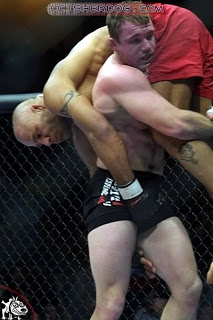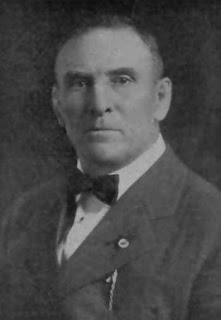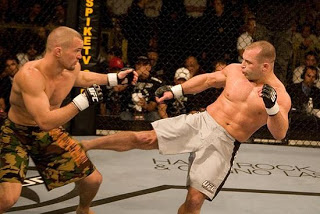Thursday, January 17, 2008
An American Pugilist
Sure enough, when Audra contacted Matt – who was away on business — he was angry.
“Is he there?” Matt growled into his cellphone. “Put him on. Let me talk to him.”
No doubt palsied with terror over the prospect of a tongue-scourging, Joey picked up the phone and meekly greeted his adopted father.
“Joey, what happened?” Matt asked with an edge to his solicitous tone.
“Us kids were playing,” Joey began earnestly, if ungrammatically, “and we started kicking and pushing. Everybody was doing it!”
This excuse – foolishness is excusable because it’s ubiquitous — cut as little ice with Matt as it would with most fathers. Joey was being raised differently, and there was a higher standard he had to meet.
“Joey,” Matt began, striving to retain his composure, “were you using your toe? Or your shin?”
“Toe,” Joey replied in an all-but-inaudible voice.
“Joey, you can’t do that!” Matt exclaimed as he erupted in frustrated indignation. “If you’re going to kick somebody, you’ve gotta use your shin. You’re going to break your toe.”
“I know,” whimpered Joey beneath the paternal rebuke. Audra, who overheard the conversation, snatched the phone from her son’s hand and delivered a rebuke of her own.
“Matt, I’m trying to teach him that he shouldn’t be getting into trouble, not which way he should be hitting the other kids!”
Matt Hughes hoists Frank Trigg en route to a body slam KO.
That may prove to be difficult, since Joey Hughes’ father Matt is a nine-time Ultimate Fighting Championship (UFC) welterweight world champion who, at 34, has spent the better part of three decades immersed in single combat – first amateur wrestling, and then mixed martial arts (MMA).
So you want to pacify Joey’s pugilistic streak, Audra? Hey, good luck with that.
The original title of Matt Hughes’ recently published memoir Made in America was “Fighting Solves Everything.” While that statement isn’t true, it would have made a much better title, and been a more accurate reflection of Hughes’ life story thus far.
He arrived as part of a matching set on October 13, 1974, born to a farmer from Hillsboro, Illinois (current population circa 6,200). Matt and his identical twin Mark spent the first two decades of their lives doing exactly the same things as tens of millions of other boys from the Midwest. Exploiting the plentiful opportunities offered by growing up on a farm, Matt and Mark found endless inventive ways to get into trouble. Some of them – using the spillway of a local dam as a waterslide, for example — proved fatal to some of their friends. (This is an appropriate time to remember the old saw about the proverbial Redneck’s Last Words: “Hey, watch this!”)
As was the case with too many Midwestern farm households in the late 1970s and early 1980s, the Hughes family was financially ruined by decisions made in Washington.
The Soviet grain embargo cut the price of wheat by more than half; at roughly the same time, the Federal Land Bank, which set the prices and mortgage rates on farm loans, was jacking up its interest rates. During the early 1980s, “the farms started falling like dominoes,” Matt recalls, and his parents were among the casualties. In an effort to stave off bankruptcy, Matt’s father started to sell off farm assets, then parcels of land. Eventually both parents were driven to take outside jobs, and the marriage collapsed.
Midwest born and bred: Matt Hughes (left) with his twin brother Mark and three canine friends on Matt’s farm in Illinois.
By this time, the Hughes twins had become athletic standouts at the local high school. Like many farm boys, Matt and his brother Mark were blessed with natural strength and an appetite for manual labor – and, as a result, they excelled at wrestling, the purest of all sports. Matt was a two-time Illinois class A state champion who went on to become a two-time Division I All-American for Eastern Illinois University.
The personality that reveals itself in the pages of Hughes’ memoir (written with the help of a co-author identified as Michael Malice) could be described as Midwestern Stoic. His disposition is well-suited to both farming and MMA. It’s captured best in his description of nearly dying in the spillway while trying to rescue a drunken friend:
“For almost ten years I had been throwing people around on mats; I had been lifting weights to build up my strength; I had been swimming my entire life. But all these things were a joke compared to the power of that rushing water. My body flew all around that spillway. I couldn’t control where I was going. I didn’t have a choice as to where I was going to end up. It was a feeling I had never experienced before or since: complete helplessness.
The water took me down at first, and then it took me back a little ways. I pushed off the concrete floor…. I shot up off the bottom, and the current took me back to the center of the spillway, and then it sucked me down again. I didn’t know when I was going to pop up; I didn’t know when I was going to get pulled under.
After three cycles of this, I thought, There’s nothing you can do. This is it. You’re going to die.”
Matt kept his wits intact, curled up in a ball, and was shot downstream out of the whirlpool like a projectile. He later reflected that “I had been as close to my own death as I could have possibly gotten, but I hadn’t found it to be such a horrible thing. It wouldn’t have been a peaceful death, but it wouldn’t have been an unspeakable tragedy. It wasn’t something for me to be afraid of.”
That sense of composure, when added to Matt’s preternatural athleticism, made him all but unbeatable in the ring, cage, or octagon. There is little subtlety to Matt’s fighting style, which could be described as “ground-and-pound” leavened with a few submissions.
At 5’9” and 170 pounds, Matt can bench press roughly twice his bodyweight. He has the neck of an NFL nose tackle twice his size; that attribute, along with his demeanor, austere training methods, and devotion to farm life reminds me of another Midwestern wrestling legend, Iowa’s Martin “Farmer” Burns. Matt’s preferred game plan is to pick up his opponent, carry him across the ring, and body-slam him as hard as he can. (See the photo above for a suitable illustration.)
Matt drifted into MMA almost as a lark. As he points out, collegiate wrestling standouts don’t have terrific career prospects. As a Division I All-American, Matt was one of the country’s eight top collegiate wrestlers when he graduated. “The top eight football players to graduate college every year are instant millionaires,” he writes. “This top eight wrestler who graduated college in 1997 got to stay on as assistant wrestling coach at Eastern, as well as to do electrical work on the side for $14 an hour — $28.88 if it was a state job, time and a half for overtime. But it was work, and I was using my hands, so it didn’t bother me.”
As for making a living in the sport at which he excelled: “There is no venue for wrestlers after we graduate, except for the low-paying, constantly traveling world of the United States Army team. Professional wrestlers are talkers first, bodybuilders second, and stuntmen third.” He drifted into MMA by way of a friend who recruited him to be a training partner.
Grappling legend Martin “Farmer” Burns.
Matt soon found himself fighting in small clubs in Wisconsin, and in arenas in Japan. His grappling career took him as far as the United Arab Emirates, where he took part in the Abu Dhabi Combat Club submission wrestling tournament – an event created by Sheik Tahnoon bin Zayed al Nayan, the son of the former UAE president.
During his first MMA bout, Matt was talent-spotted by the referee, who just happened to be UFC welterweight champion Pat Miletich. Eventually Matt would join Miletich’s MMA stable in Bettendorf, Iowa, which trained in an unadorned brick building that “was the simplest thing you could still call architecture.” Thanks to the technical skills and discipline he acquired under Miletich’s tutelage, Matt became one of three world champions produced by Miletich Fighting Systems.
For reasons I can’t identify, Matt is considered arrogant and sanctimonious. That impression is difficult to sustain in the face of the candor and self-deprecating humor on display in his memoir.
After his likeness had been included among UFC standouts in the organization’s first video game, for example, Matt reflected that “Kids all over America and the world would be able to skip over me when picking Mark Coleman or Kevin Randleman to be their character.” Referring to a match he lost because he left his neck open to a triangle choke, Matt’s praire-dry wit strikes again: “There’s a term in Brazilian jiu-jitsu for someone who notices an opening and leaves that opening there for their opponent to exploit. That term is idiot.”
Clearly, although Matt Hughes – like anyone else who competes in combat sports for a living – has an ego, albeit an unexceptional one by the standards of his profession. His reputation as a stuck-up jerk might be an untutored and undeserved reaction to his conversion to Christianity, which took place during a visit to Juarez, Mexico shortly after his wedding in 2004. Matt, his brother Mark, and several others went to Mexico to build an addition to an orphanage. Matt went along because he the prospect of several days of pouring concrete struck him as a pleasant vacation: “If we’re doing manual labor, I guess I can have a good time.”
Matt, who had been attending church to please his new wife and reading the Bible as a curious skeptic, found himself drawn into a spiritual current as irresistible as the whirlpool that had nearly killed him years earlier. He found himself praying to Christ for forgiveness and salvation, and then feeling “like I was a candle which had just been lit for the first time.”
He describes a similar experience that took place as he and his support crew prayed before his 2006 UFC match against Royce Gracie. As a chiropractor nicknamed the Witch Doctor prayed, Matt felt himself “spiritually in another place” as some thoughts not typical of a professional fighter coursed through his mind:
“I’m not worthy of all God’s blessings…. I don’t deserve to have such a great family. I don’t deserve to never have to worry about putting food on the table and clothes on my kids’ backs. I don’t deserve to have such total support from my family and friends. I don’t deserve to be able to do what I love, all the time. I don’t deserve all these things, God. Why have You chosen me?”
One of the larger blessings in Matt’s life was the failure of the political class to kill off mixed martial arts. In 1996, the year Matt started competing, Senator John McCain began a jihad against the sport, denouncing it as “human cockfighting” and using what influence he could to have state athletic boards shut down UFC and other MMA events.
McCain, who can countenance wars of aggression that slaughter hundreds of thousands of innocent civilians, denounced MMA competition — in which most matches end through submission — as “barbaric.” Oddly enough, he has no similar scruples about boxing: The Senator and all-purpose moral scold was ringside at the 1995 fight during which Jimmy Garcia was killed in the ring.
Apparently, McCain considers MMA a scandalous waste of aggression: Why let young athletes compete for money and individual acclaim, when they could be stuffed into uniforms and sent abroad to kill foreigners on behalf of the State?
By the late 1990s, thirty-six states had banned MMA events. The UFC, by far the largest promotion, was practically bankrupt when it was bought by an investment group fronted by former boxer and college dropout named Dana White, who is the organization’s current president. White has proven to have a tremendous gift for promotion: He imposed strict drug-testing standards on UFC athletes, emphasized the sport’s safety precautions, and — most importantly — developed a Spike TV “reality” show to promote the organization and cultivate new fighters.
The appeal of MMA goes well beyond prurient interests of various kinds. A lot of it has to do with simple admiration for the athletic excellence displayed by successful MMA competitors, who must master the rudiments of several combative arts — wrestling, boxing, kick-boxing, and some form of submission grappling, such as jiu-jitsu.
“Imagine that you had to be great at all the primary baseball skills, great at all the primary football skills and great at all the primary basketball skills, and you had to perform them all at the same time just to be able to compete,” explains Eric Lawson, a part-time MMA competitor from California. “That gives you an idea.”
When he’s not competing, by the way, Lawson works as a mortgage planner. Given the collapse of the housing bubble, Lawson is fortunate to have a career “Plan B” of some kind. In similar fashion, MMA proved to be a blessing for Matt Hughes, the product of a family that was financially ruined by the capricious decisions of the corporatist Power Elite.
That there is a “Bread and Circuses” flavor to the UFC, no honest person can deny. But after one pares away the extraneous marketing elements, what remains is an updated version of the world’s oldest contact sport. While refined people may consider MMA unseemly, it really isn’t that different from the variety of “Catch” Wrestling practiced by George Washington, who at age 47 (easily the equivalent of 65 today) once wrestled and defeated seven straight opponents.
In its eclecticism and individualistic nature, mixed martial arts is every bit as innately American as baseball or basketball (the latter of which, remember, was born here). And the aptitudes it cultivates in participants may prove indispensable as our illusive prosperity evaporates, tyranny coalesces, and times become grim.
For Matt Hughes (whose career may be over after a recent loss to Canadian Georges St.-Pierre), MMA offered a chance to earn a living doing what he loved. What could be more American than that?
Dum spiro, pugno!
Content retrieved from: http://freedominourtime.blogspot.com/2008/01/american-pugilist.html.































